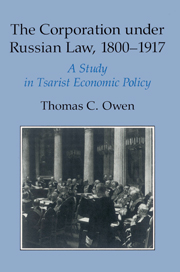Book contents
- Frontmatter
- Contents
- List of tables
- Preface
- Abbreviations
- The corporation under Russian law, 1800–1917
- 1 Zakon (The law), 1800–1856
- 2 Birzhevaia goriachka (Stock-exchange fever), 1856–1870
- 3 Proval reformy (The failure of reform), 1860–1874
- 4 Opeka (Tutelage), 1865–1890
- 5 Proizvol (Arbitrary acts), 1880–1905
- 6 Bezobrazie (Outrage), 1905–1914
- 7 Tupik (Dead end), 1914–1917
- 8 Autocracy, corporate law, and the dilemma of cultural delay
- Selected bibliography
- Index
- Studies of the Harriman Institute
6 - Bezobrazie (Outrage), 1905–1914
Published online by Cambridge University Press: 22 September 2009
- Frontmatter
- Contents
- List of tables
- Preface
- Abbreviations
- The corporation under Russian law, 1800–1917
- 1 Zakon (The law), 1800–1856
- 2 Birzhevaia goriachka (Stock-exchange fever), 1856–1870
- 3 Proval reformy (The failure of reform), 1860–1874
- 4 Opeka (Tutelage), 1865–1890
- 5 Proizvol (Arbitrary acts), 1880–1905
- 6 Bezobrazie (Outrage), 1905–1914
- 7 Tupik (Dead end), 1914–1917
- 8 Autocracy, corporate law, and the dilemma of cultural delay
- Selected bibliography
- Index
- Studies of the Harriman Institute
Summary
The smooth, peaceful course of political life; the protection of property and individual interests against arbitrary [proizvol'nye] violations; stable laws [tverdoe pravo]; legality [zakonnost']; and extensive education in the country – all these are as essential to industry as air. Therefore, gentlemen, the immediate interests of Russian industry coincide with the sacred strivings of all Russian society, which must realize that the vigorous development of commerce and industry in our country will inevitably introduce healthy principles into the entire atmosphere of state and public life.
– Aleksandr I. Konovalov, in a speech at the centennial celebration of his family's textile firm (September 1912)The period between the revolution of 1905 and the outbreak of World War I in July 1914 witnessed a welter of confusing portents of political change, both positive and negative. Relaxed censorship, increased religious freedoms, the installation of a semiparliamentary regime, and rising urban literacy rates have provided optimists with a certain factual support for their contention that Russian society was well on the road to adopting the hallmarks of West European culture and shedding the legacy of the tsars: autocratic rule, mass illiteracy, and the debilitating coarseness of life among peasants and workers. Critics of this optimistic assessment point, however, to the tsarist government's refusal to accord full legislative power to the State Duma and State Council, the persistence of a ministry responsible to the tsar, and the failure of liberals to pass a land reform that might have forestalled the peasant revolution of 1917.
- Type
- Chapter
- Information
- The Corporation under Russian Law, 1800–1917A Study in Tsarist Economic Policy, pp. 155 - 180Publisher: Cambridge University PressPrint publication year: 1991



